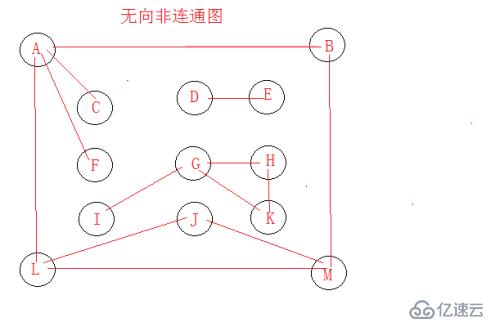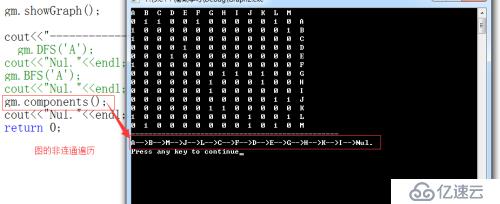жӮЁеҘҪпјҢзҷ»еҪ•еҗҺжүҚиғҪдёӢи®ўеҚ•е“ҰпјҒ
1гҖҒиҝһйҖҡеӣҫе’ҢйқһиҝһйҖҡеӣҫ
иҝһйҖҡеӣҫпјҡд»»ж„Ҹзҡ„дёҖдёӘйЎ¶зӮ№еҲ°д»»ж„Ҹзҡ„еҸҰеӨ–дёҖдёӘйЎ¶зӮ№йғҪжңүзқҖзӣёеә”зҡ„и·Ҝеҫ„жүҖиғҪеӨҹеҲ°иҫҫгҖӮ
йқһиҝһйҖҡеӣҫпјҡеҸӘиҰҒжүҫеҮәдәҶжңүдёҖдёӘйЎ¶зӮ№дёҚиғҪеӨҹеҲ°иҫҫеҸҰеӨ–дёҖдёӘйЎ¶зӮ№гҖӮ
2гҖҒйҒҚеҺҶ
еҜ№дәҺиҝһйҖҡеӣҫжқҘиҜҙпјҢйҖҡиҝҮDFSжҲ–BFSе°ұеҸҜд»Ҙе®ҢжҲҗйҒҚеҺҶпјӣ
еҜ№дәҺйқһиҝһйҖҡеӣҫжқҘиҜҙпјҢе°ұеҫ—д»ҺжҜҸдёӘйЎ¶зӮ№еҮәеҸ‘иҝӣиЎҢжҗңзҙўпјҢжҜҸдёҖж¬Ўзҡ„д»ҺдёҖдёӘж–°зҡ„йЎ¶зӮ№еҮәеҸ‘и®ҝй—®пјҢжҜҸдёӘйЎ¶зӮ№йғҪиҰҒејҖе§ӢжҗңзҙўдёҖйҒҚгҖӮ
3гҖҒйқһиҝһйҖҡеӣҫзҡ„йҒҚеҺҶз®—жі•
(1)гҖҒдёҚеҸҜеҸ–зҡ„з®—жі•пјҡжІЎжңүеҝ…иҰҒе°ҶйқһиҝһйҖҡеӣҫз”ҹжҲҗжЈ®жһ—пјҢеңЁз”ұжЈ®жһ—з”ҹжҲҗжҲ‘们зҡ„йҒҚеҺҶж ‘пјҢ然еҗҺеҶҚиҝӣиЎҢж ‘еҪўз»“жһ„зҡ„и®ҝй—®гҖӮ
(2)гҖҒжҜ”иҫғеҘҪзҡ„з®—жі•пјҡзӣҙжҺҘи°ғеҠЁжҲ‘们д№ӢеүҚзј–еҶҷеҘҪзҡ„DFS()еҮҪж•°пјӣеҸӘиҰҒжІЎжңүи®ҝй—®зҡ„йЎ¶зӮ№пјҢжҲ‘们е°ұз”ұиҜҘйЎ¶зӮ№еҮәеҸ‘иҝӣиЎҢж·ұеәҰдјҳе…ҲйҒҚеҺҶпјҢиҝҷж ·е°ұжңҖз»ҲжҠҠж•ҙдёӘйқһиҝһйҖҡеӣҫе°ұйҒҚеҺҶе®ҢжҲҗгҖӮ
(3)ејәиҝһйҖҡеӣҫпјҡй’ҲеҜ№жңүеҗ‘еӣҫпјҢжңүA-->Bзҡ„иҫ№пјҢдёҖе®ҡд№ҹжңүB-->Aзҡ„иҫ№гҖӮ
(4)гҖҒйҒҚеҺҶз®—жі•пјҡ
void components(){ //йқһиҝһйҖҡеӣҫзҡ„йҒҚеҺҶ
int n = Graph<Type>::getCurVertex();
bool *visit = new bool[n];
for(int i = 0; i < n; i++){
visit[i] = false;
}
for(i = 0; i < n; i++){ //еҜ№жҜҸдёӘйЎ¶зӮ№йғҪзңӢдёҖдёӢпјҢжҳҜеҗҰи®ҝй—®иҝҮгҖӮ4
if(!visit[i]){
DFS(getValue(i), visit);
}
}
delete []visit;
}4гҖҒе®Ңж•ҙд»Јз ҒгҖҒжөӢиҜ•д»Јз ҒгҖҒжөӢиҜ•з»“жһң
(1)гҖҒе®Ңж•ҙд»Јз Ғ
#ifndef _GRAPH_H_
#define _GRAPH_H_
#include<iostream>
#include<queue>
using namespace std;
#define VERTEX_DEFAULT_SIZE 20
template<typename Type>
class Graph{
public:
bool isEmpty()const{
return curVertices == 0;
}
bool isFull()const{
if(curVertices >= maxVertices || curEdges >= curVertices*(curVertices-1)/2)
return true; //еӣҫж»Ўжңү2з§Қжғ…еҶөпјҡ(1)гҖҒеҪ“еүҚйЎ¶зӮ№ж•°и¶…иҝҮдәҶжңҖеӨ§йЎ¶зӮ№ж•°пјҢеӯҳж”ҫйЎ¶зӮ№зҡ„з©әй—ҙе·Іж»Ў
return false; //(2)гҖҒеҪ“еүҚйЎ¶зӮ№ж•°е№¶жІЎжңүж»ЎпјҢдҪҶжҳҜеҪ“еүҚйЎ¶зӮ№жүҖиғҪиҫҫеҲ°зҡ„иҫ№ж•°е·Іж»Ў
}
int getCurVertex()const{
return curVertices;
}
int getCurEdge()const{
return curEdges;
}
public:
virtual bool insertVertex(const Type &v) = 0; //жҸ’е…ҘйЎ¶зӮ№
virtual bool insertEdge(const Type &v1, const Type &v2) = 0; //жҸ’е…Ҙиҫ№
virtual bool removeVertex(const Type &v) = 0; //еҲ йҷӨйЎ¶зӮ№
virtual bool removeEdge(const Type &v1, const Type &v2) = 0; //еҲ йҷӨиҫ№
virtual int getFirstNeighbor(const Type &v) = 0; //еҫ—еҲ°з¬¬дёҖдёӘзӣёйӮ»йЎ¶зӮ№
virtual int getNextNeighbor(const Type &v, const Type &w) = 0; //еҫ—еҲ°дёӢдёҖдёӘзӣёйӮ»йЎ¶зӮ№
public:
virtual int getVertexIndex(const Type &v)const = 0; //еҫ—еҲ°йЎ¶зӮ№дёӢж Ү
virtual void showGraph()const = 0; //жҳҫзӨәеӣҫ
virtual Type getValue(int index)const = 0;
public:
virtual void DFS(const Type &v) = 0; //ж·ұеәҰдјҳе…Ҳ
virtual void BFS(const Type &v) = 0; //е№ҝеәҰдјҳе…Ҳ
protected:
int maxVertices; //жңҖеӨ§йЎ¶зӮ№ж•°
int curVertices; //еҪ“еүҚйЎ¶зӮ№ж•°
int curEdges; //еҪ“еүҚиҫ№ж•°
};
template<typename Type>
class GraphMtx : public Graph<Type>{ //йӮ»жҺҘзҹ©йҳө继жүҝзҲ¶зұ»зҹ©йҳө
#define maxVertices Graph<Type>::maxVertices //еӣ дёәжҳҜжЁЎжқҝпјҢжүҖд»Ҙз”ЁзҲ¶зұ»зҡ„ж•°жҚ®жҲ–ж–№жі•йғҪеҫ—еҠ дёҠдҪңз”Ёеҹҹйҷҗе®ҡз¬Ұ
#define curVertices Graph<Type>::curVertices
#define curEdges Graph<Type>::curEdges
public:
GraphMtx(int vertexSize = VERTEX_DEFAULT_SIZE){ //еҲқе§ӢеҢ–йӮ»жҺҘзҹ©йҳө
maxVertices = vertexSize > VERTEX_DEFAULT_SIZE ? vertexSize : VERTEX_DEFAULT_SIZE;
vertexList = new Type[maxVertices]; //з”іиҜ·йЎ¶зӮ№з©әй—ҙ
for(int i = 0; i < maxVertices; i++){ //йғҪеҲқе§ӢеҢ–дёә0
vertexList[i] = 0;
}
edge = new int*[maxVertices]; //з”іиҜ·иҫ№зҡ„иЎҢ
for(i = 0; i < maxVertices; i++){ //з”іиҜ·еҲ—з©әй—ҙ
edge[i] = new int[maxVertices];
}
for(i = 0; i < maxVertices; i++){ //иөӢеҲқеҖјдёә0
for(int j = 0; j < maxVertices; j++){
edge[i][j] = 0;
}
}
curVertices = curEdges = 0; //еҪ“еүҚйЎ¶зӮ№е’ҢеҪ“еүҚиҫ№ж•°
}
GraphMtx(Type (*mt)[4], int sz){ //йҖҡиҝҮе·Іжңүзҹ©йҳөзҡ„еҲқе§ӢеҢ–
int e = 0; //з»ҹи®Ўиҫ№ж•°
maxVertices = sz > VERTEX_DEFAULT_SIZE ? sz : VERTEX_DEFAULT_SIZE;
vertexList = new Type[maxVertices]; //з”іиҜ·йЎ¶зӮ№з©әй—ҙ
for(int i = 0; i < maxVertices; i++){ //йғҪеҲқе§ӢеҢ–дёә0
vertexList[i] = 0;
}
edge = new int*[maxVertices]; //з”іиҜ·иҫ№зҡ„иЎҢ
for(i = 0; i < maxVertices; i++){ //з”іиҜ·еҲ—з©әй—ҙ
edge[i] = new Type[maxVertices];
}
for(i = 0; i < maxVertices; i++){ //иөӢеҲқеҖјдёәзҹ©йҳөеҪ“дёӯзҡ„еҖј
for(int j = 0; j < maxVertices; j++){
edge[i][j] = mt[i][j];
if(edge[i][j] != 0){
e++; //з»ҹи®ЎеҲ—зҡ„иҫ№ж•°
}
}
}
curVertices = sz;
curEdges = e/2;
}
~GraphMtx(){}
public:
bool insertVertex(const Type &v){
if(curVertices >= maxVertices){
return false;
}
vertexList[curVertices++] = v;
return true;
}
bool insertEdge(const Type &v1, const Type &v2){
int maxEdges = curVertices*(curVertices-1)/2;
if(curEdges >= maxEdges){
return false;
}
int v = getVertexIndex(v1);
int w = getVertexIndex(v2);
if(v==-1 || w==-1){
cout<<"edge no exit"<<endl; //иҰҒжҸ’е…Ҙзҡ„йЎ¶зӮ№дёҚеӯҳеңЁпјҢж— жі•жҸ’е…Ҙ
return false;
}
if(edge[v][w] != 0){ //еҪ“еүҚиҫ№е·Із»ҸеӯҳеңЁпјҢдёҚиғҪиҝӣиЎҢжҸ’е…Ҙ
return false;
}
edge[v][w] = edge[w][v] = 1; //еӣ дёәжҳҜж— еҗ‘еӣҫпјҢеҜ№з§°зҡ„пјҢеӯҳеңЁиҫ№иөӢдёә1пјӣ
return true;
} //еҲ йҷӨйЎ¶зӮ№зҡ„й«ҳж•Ҳж–№жі•
bool removeVertex(const Type &v){
int i = getVertexIndex(v);
if(i == -1){
return false;
}
vertexList[i] = vertexList[curVertices-1];
int edgeCount = 0;
for(int k = 0; k < curVertices; k++){
if(edge[i][k] != 0){ //з»ҹи®ЎеҲ йҷӨйӮЈиЎҢзҡ„иҫ№ж•°
edgeCount++;
}
}
//еҲ йҷӨиЎҢ
for(int j = 0; j < curVertices; j++){
edge[i][j] = edge[curVertices-1][j];
}
//еҲ йҷӨеҲ—
for(j = 0; j < curVertices; j++){
edge[j][i] = edge[j][curVertices-1];
}
curVertices--;
curEdges -= edgeCount;
return true;
}
/* //еҲ йҷӨйЎ¶зӮ№з”Ёзҡ„жҳҜж•°з»„дёҖдёӘдёҖдёӘ移еҠЁзҡ„ж–№жі•пјҢж•ҲзҺҮеӨӘдҪҺгҖӮ
bool removeVertex(const Type &v){
int i = getVertexIndex(v);
if(i == -1){
return false;
}
for(int k = i; k < curVertices-1; ++k){
vertexList[k] = vertexList[k+1];
}
int edgeCount = 0;
for(int j = 0; j < curVertices; ++j){
if(edge[i][j] != 0)
edgeCount++;
}
for(int k = i; k < curVertices-1; ++k)
{
for(int j = 0; j < curVertices; ++j)
{
edge[k][j] = edge[k+1][j];
}
}
for(int k = i; k < curVertices-1; ++k)
{
for(int j = 0; j < curVertices; ++j)
{
edge[j][k] = edge[j][k+1];
}
}
curVertices--;
curEdges -= edgeCount;
return true;
}
*/
bool removeEdge(const Type &v1, const Type &v2){
int v = getVertexIndex(v1);
int w = getVertexIndex(v2);
if(v==-1 || w==-1){ //еҲӨж–ӯиҰҒеҲ йҷӨзҡ„иҫ№жҳҜеҗҰеңЁеҪ“еүҚйЎ¶зӮ№еҶ…
return false; //йЎ¶зӮ№дёҚеӯҳеңЁ
}
if(edge[v][w] == 0){ //иҝҷдёӘиҫ№ж №жң¬дёҚеӯҳеңЁпјҢжІЎжңүеҝ…иҰҒеҲ
return false;
}
edge[v][w] = edge[w][v] = 0; //еҲ йҷӨиҝҷдёӘиҫ№иөӢеҖјдёә0пјҢд»ЈиЎЁдёҚеӯҳеңЁпјӣ
curEdges--;
return true;
}
int getFirstNeighbor(const Type &v){
int i = getVertexIndex(v);
if(i == -1){
return -1;
}
for(int col = 0; col < curVertices; col++){
if(edge[i][col] != 0){
return col;
}
}
return -1;
}
int getNextNeighbor(const Type &v, const Type &w){
int i = getVertexIndex(v);
int j = getVertexIndex(w);
if(i==-1 || j==-1){
return -1;
}
for(int col = j+1; col < curVertices; col++){
if(edge[i][col] != 0){
return col;
}
}
return -1;
}
public:
void showGraph()const{
if(curVertices == 0){
cout<<"Nul Graph"<<endl;
return;
}
for(int i = 0; i < curVertices; i++){
cout<<vertexList[i]<<" ";
}
cout<<endl;
for(i = 0; i < curVertices; i++){
for(int j = 0; j < curVertices; j++){
cout<<edge[i][j]<<" ";
}
cout<<vertexList[i]<<endl;
}
}
int getVertexIndex(const Type &v)const{
for(int i = 0; i < curVertices; i++){
if(vertexList[i] == v){
return i;
}
}
return -1;
}
public:
Type getValue(int index)const{
return vertexList[index];
}
void DFS(const Type &v){
int n = Graph<Type>::getCurVertex();
bool *visit = new bool[n];
for(int i = 0; i < n; i++){
visit[i] = false;
}
DFS(v, visit);
delete []visit;
}
void BFS(const Type &v){
int n = Graph<Type>::getCurVertex();
bool *visit = new bool[n];
for(int i = 0; i < n; i++){
visit[i] = false;
}
cout<<v<<"-->";
int index = getVertexIndex(v);
visit[index] = true;
queue<int> q; //йҳҹеҲ—дёӯеӯҳж”ҫзҡ„жҳҜйЎ¶зӮ№дёӢж Ү;
q.push(index);
int w;
while(!q.empty()){
index = q.front();
q.pop();
w = getFirstNeighbor(getValue(index));
while(w != -1){
if(!visit[w]){
cout<<getValue(w)<<"-->";
visit[w] = true;
q.push(w);
}
w = getNextNeighbor(getValue(index), getValue(w));
}
}
delete []visit;
}
void components(){ //йқһиҝһйҖҡеӣҫзҡ„йҒҚеҺҶ
int n = Graph<Type>::getCurVertex();
bool *visit = new bool[n];
for(int i = 0; i < n; i++){
visit[i] = false;
}
for(i = 0; i < n; i++){
if(!visit[i]){
DFS(getValue(i), visit);
}
}
delete []visit;
}
protected:
void DFS(const Type &v, bool *visit){
cout<<v<<"-->";
int index = getVertexIndex(v);
visit[index] = true;
int w = getFirstNeighbor(v);
while(w != -1){
if(!visit[w]){
DFS(getValue(w), visit);
}
w = getNextNeighbor(v, getValue(w));
}
}
private:
Type *vertexList; //еӯҳж”ҫйЎ¶зӮ№зҡ„ж•°з»„
int **edge; //еӯҳж”ҫиҫ№е…ізі»зҡ„зҹ©йҳө
};
#endif(2)гҖҒжөӢиҜ•д»Јз Ғ
#include"Graph3.h"
int main(void){
GraphMtx<char> gm;
gm.insertVertex('A');
gm.insertVertex('B');
gm.insertVertex('C'); //Bзҡ„第дёҖдёӘйӮ»жҺҘйЎ¶зӮ№жҳҜCпјҢ
gm.insertVertex('D');
gm.insertVertex('E');
gm.insertVertex('F');
gm.insertVertex('G');
gm.insertVertex('H');
gm.insertVertex('I');
gm.insertVertex('J');
gm.insertVertex('K');
gm.insertVertex('L');
gm.insertVertex('M');
gm.insertEdge('A','B');
gm.insertEdge('A','C');
gm.insertEdge('A','F');
gm.insertEdge('A','L');
gm.insertEdge('B','M');
gm.insertEdge('L','J');
gm.insertEdge('L','M');
gm.insertEdge('J','M');
gm.insertEdge('D','E');
gm.insertEdge('G','H');
gm.insertEdge('G','I');
gm.insertEdge('G','K');
gm.insertEdge('H','K');
gm.showGraph();
cout<<"------------------------------------------------"<<endl;
gm.DFS('A');
cout<<"Nul."<<endl;
gm.BFS('A');
cout<<"Nul."<<endl;
gm.components();
cout<<"Nul."<<endl;
return 0;
}(3)гҖҒжөӢиҜ•з»“жһң
жөӢиҜ•еӣҫзҡ„жЁЎеһӢпјҡ


е…ҚиҙЈеЈ°жҳҺпјҡжң¬з«ҷеҸ‘еёғзҡ„еҶ…е®№пјҲеӣҫзүҮгҖҒи§Ҷйў‘е’Ңж–Үеӯ—пјүд»ҘеҺҹеҲӣгҖҒиҪ¬иҪҪе’ҢеҲҶдә«дёәдё»пјҢж–Үз« и§ӮзӮ№дёҚд»ЈиЎЁжң¬зҪ‘з«ҷз«ӢеңәпјҢеҰӮжһңж¶үеҸҠдҫөжқғиҜ·иҒ”зі»з«ҷй•ҝйӮ®з®ұпјҡis@yisu.comиҝӣиЎҢдёҫжҠҘпјҢ并жҸҗдҫӣзӣёе…іиҜҒжҚ®пјҢдёҖз»ҸжҹҘе®һпјҢе°Ҷз«ӢеҲ»еҲ йҷӨж¶үе«ҢдҫөжқғеҶ…е®№гҖӮ
жӮЁеҘҪпјҢзҷ»еҪ•еҗҺжүҚиғҪдёӢи®ўеҚ•е“ҰпјҒ